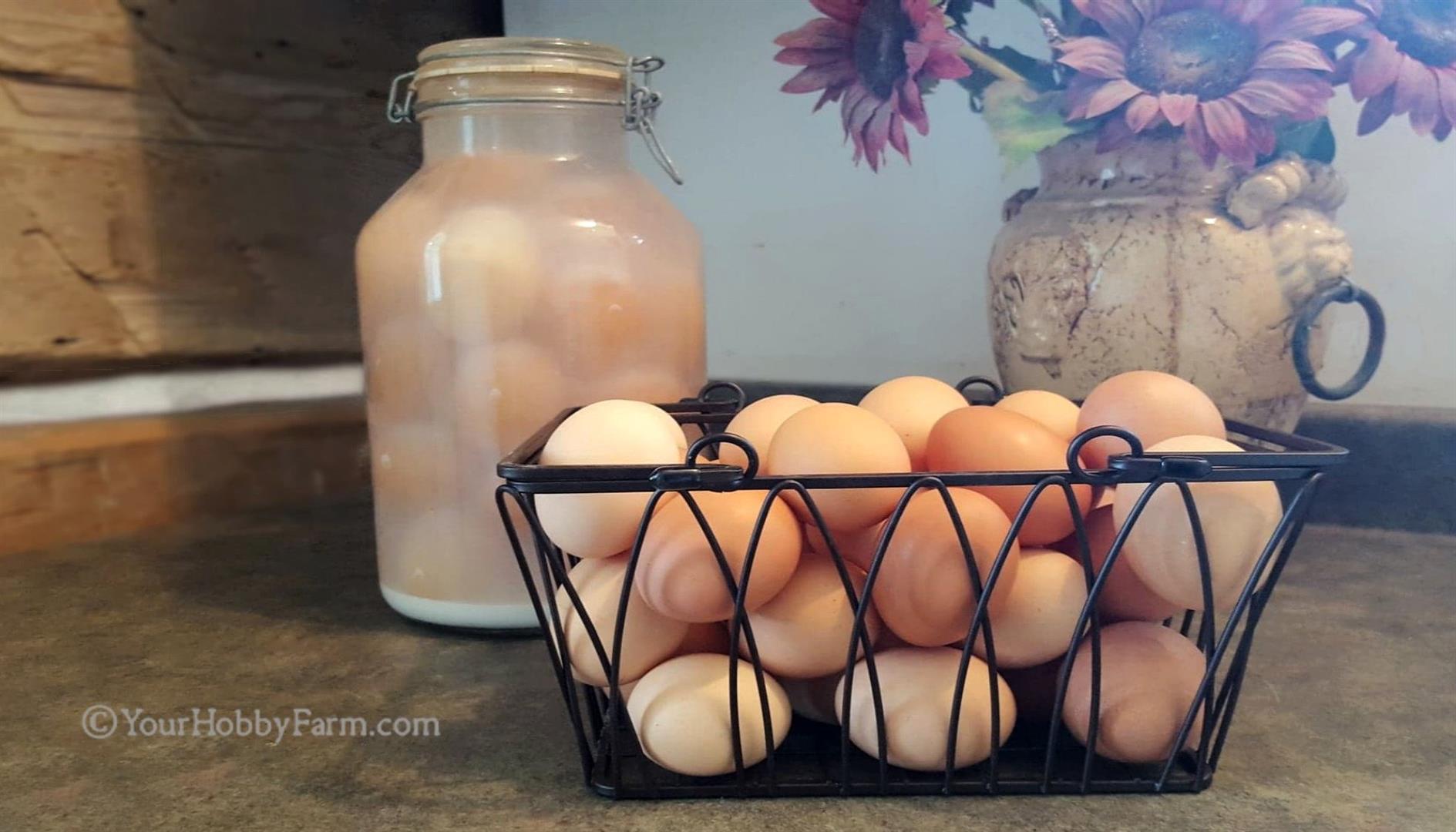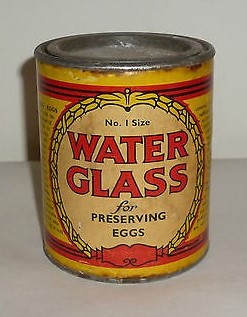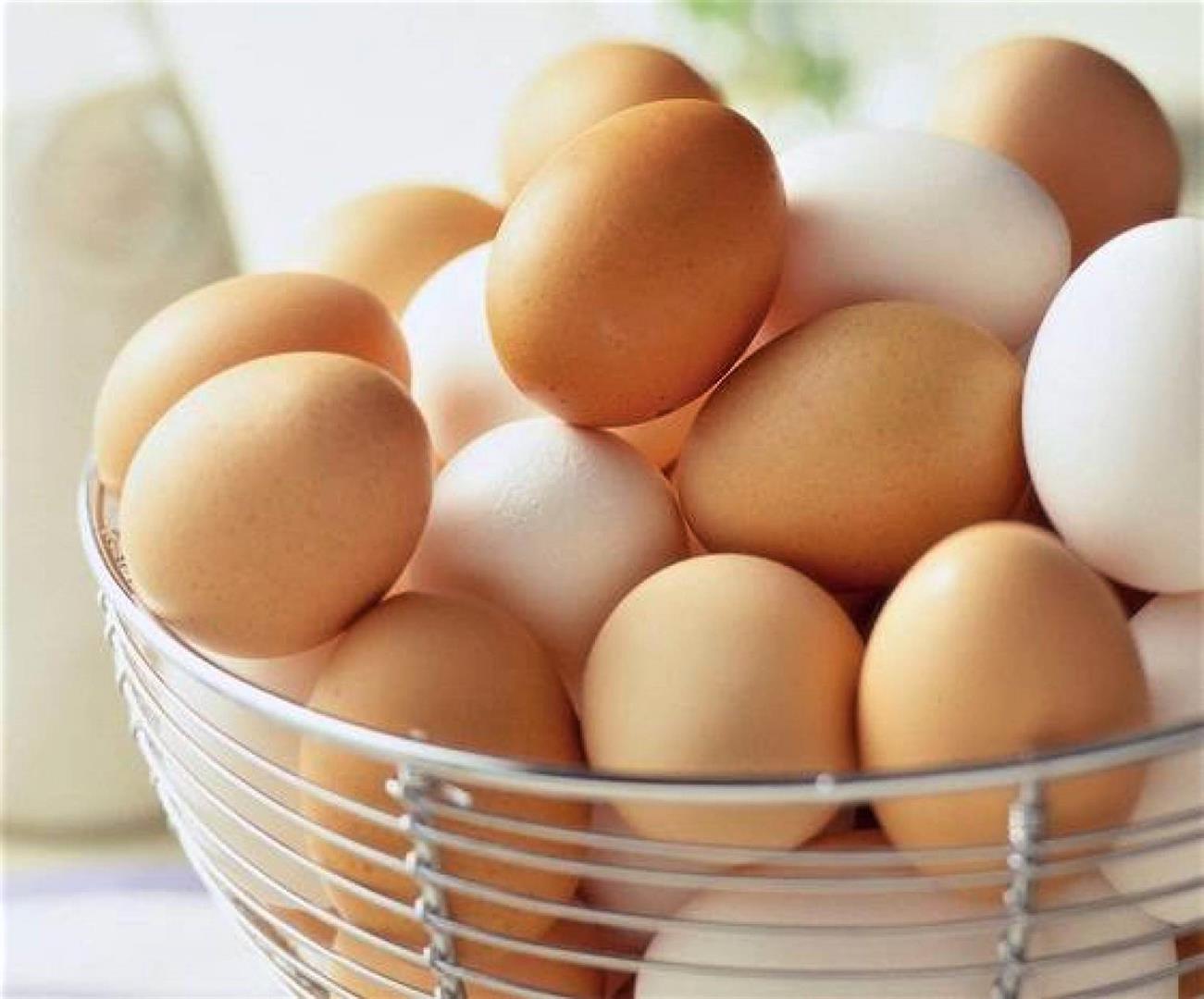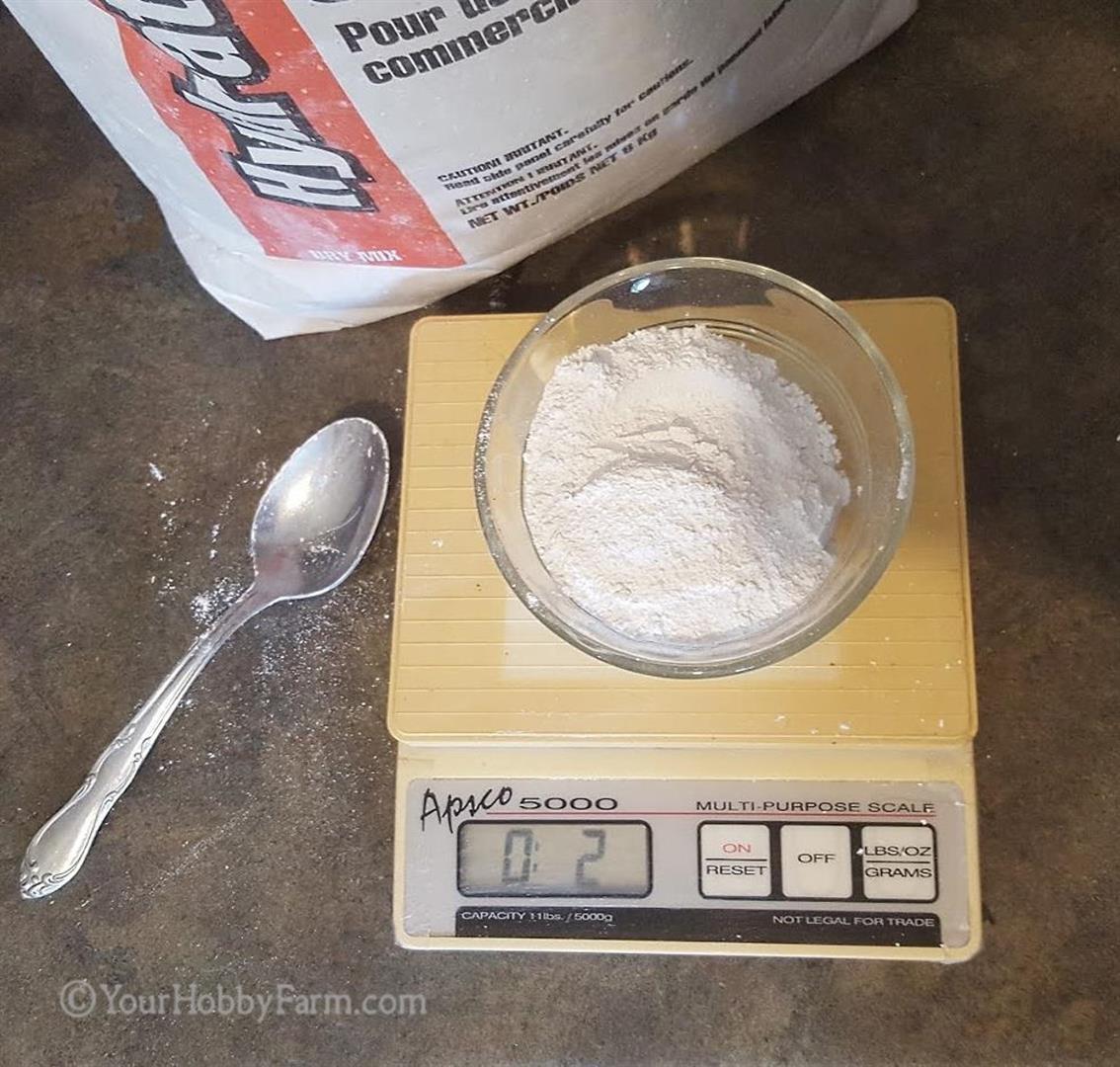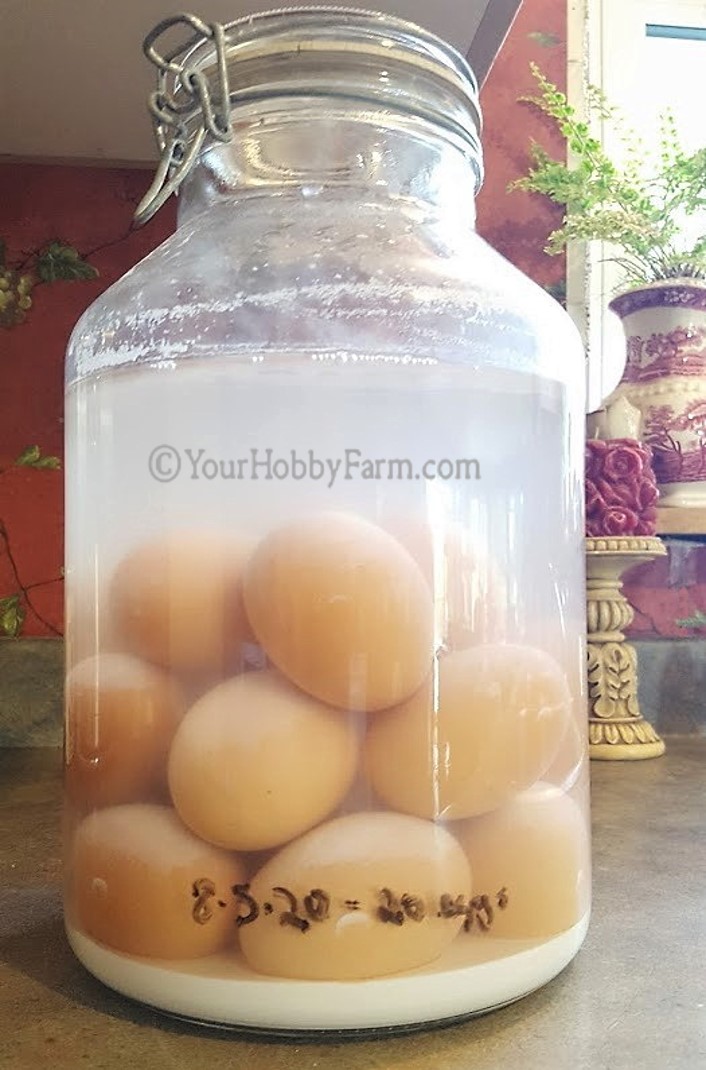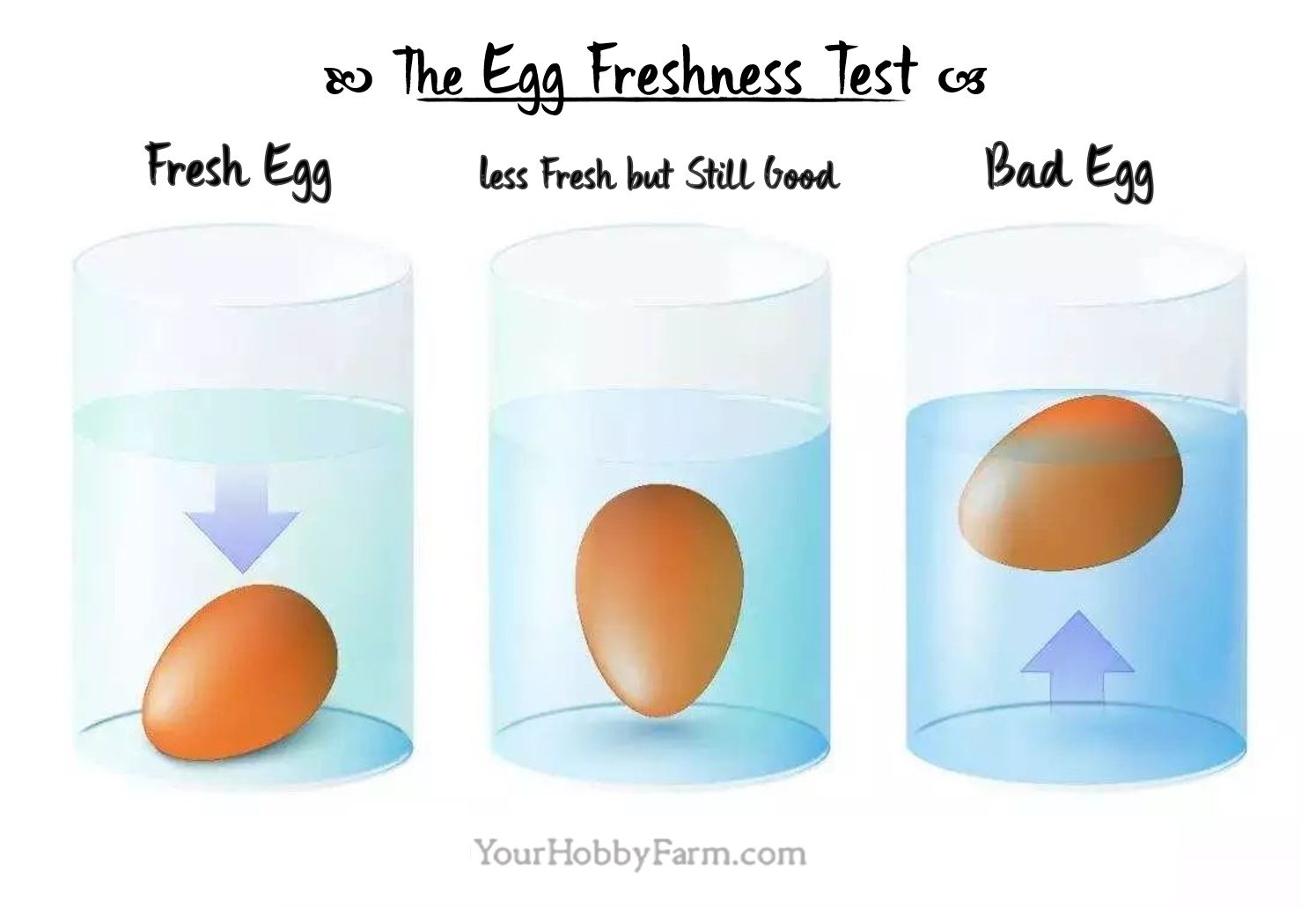Preserving the Bounty: Water Glassing Eggs
Hey friends and followers! We're changing our website address from YourHobbyFarm.com to HomesteadJoys.com.
With ongoing homestead responsibilities, this transition may take some time. Save our New Logo and QR code for easy navigation! We’d love you to join us in our journey!
 Homestead Joys Logo
Homestead Joys LogoEver heard of water glassing eggs? Not many people have nowadays. This is an easy, practical, historically proven way of safely preserving fresh eggs to use months later!
Why the Need to Preserve Eggs?
Today most of us can run down to the grocery store and easily pick up a dozen or two of eggs. But years ago, that wasn't possible. What did people do? The luxury of refrigeration is relatively recent, but people still depended on eggs as a food source year around.
Hens don't lay the same
number of eggs per season. In the spring and summer months, hens tend to
provide an abundant bounty of fresh eggs. But in the cold of winter, the
shortened daylight hours cause the hens to laid much fewer eggs and sometime they even stop laying altogether. So, especially before the use of electricity, people
learned ways to preserve their hens' eggs.
Water glassing eggs solved the problem. The practice of preserving eggs when the supply is abundant ensures that there will be plenty of eggs in the larder for later use when the egg supply is sparser through the winter months.
There are numerous ways to preserve eggs, but one great thing about this method is that it uses no electricity and no fancy equipment.
Take a peek into the past when water glassing eggs was far more common. For some interesting online reading, click the highlighted titles. A popular cookbook, first published in the 1800s, The Boston Cooking School Cookbook, by Fannie Farmer, provided instructions on water glassing eggs as a means for preserving eggs long-term. Instructions were also available in other books and writings such as Preserving Eggs for Home Use, published in 1918, and the Farmer's Bulletin 1922.
Down through many generations, if you snuck into the pantry, you would have probably found a few mysterious crocks filled with sediment covered eggs or crystal laden water. What you discovered in Grandmother's pantry was the winter's supply of preserved eggs.
Though long forgotten by most people, this method of preservation by water glassing eggs is gaining interest and, here and there, it is still being used on hobby farms and homesteads today.
So, What Exactly is Water Glassing Eggs?
First of all, to clarify any possible confusion, there are actually two similar, but distinctly different, methods of water glassing eggs. The difference is mainly the compound that is used. The preservation of eggs using either of these two methods is commonly referred to as 'water glassing eggs'. Sometimes one of these methods is also referred to as 'liming eggs'. To explain...
The chemical compound from which the term 'water glassing eggs' originally derived its name is sodium silicate, commonly called 'waterglass' or 'liquid glass'. Sodium silicate was ground up to a powder and sold in tins for one method for preserving eggs. Sometimes this is still used.
The other time-honored method of preserving eggs, also referred to as 'water glassing eggs', uses hydrated lime (calcium hydroxide). It has other names including builders' lime, slack lime, or pickling lime. Limewater is the common name for a saturated solution of hydrated lime.
As you may have guessed, it's the method using hydrated lime that is sometimes referred to as 'liming eggs', but we don't hear this term used very often.
Here at our hobby farm, we use the hydrated lime method, so that is the one we'll focus on here. Hydrated lime is readily obtained, inexpensive, and safe when used carefully. It provides a long shelf life for the eggs, and it works.
Directions for Water Glassing Eggs with Hydrated Lime
So, you've decided to try water glassing eggs? That's great! It's easy, but it's important to watch out for a few things...
This is the method that I used for water glassing fresh eggs for storage and here are the items you will need.
- A gallon jar, or a crock without cracks, or a large 3 to 5 gallon food safe bucket, lidded to keep the water from evaporating.
- Hydrated Lime
- Clean, boiled and cooled water, or distilled water if your mineral content is high.
- A kitchen weight scale for measuring the lime.
- A supply of freshly laid, visually clean, unwashed eggs.
The ratio for making the lime water is 1:1, so, 1 quart of water to 1 ounce by weight of hydrated lime. For a gallon jar, I used 2 quarts of water and 2 ounces of hydrated lime. With the 34 eggs that the jar holds, I only had to add a wee bit of water to ensure that all the eggs would be covered.
Gather all these items, as well as your fresh AND unwashed eggs together. Some say to use eggs that have been laid the same day.
Why not wash the eggs first? Great question! When you wash the eggs, you remove a very important invisible part of the egg called the 'bloom' which we explain on our Farm Fresh Eggs page. After reading it you'll understand why, if you wash the them before water glassing eggs, it will allow limewater and other contaminants to be drawn in through the thousands of tiny pores in the shell of the egg.
Having first calibrated the scales to include the weight of the bowl, carefully, spoon the hydrated lime into the bowl until you have the desired weight. See the lime to water ratio above.
A note of caution here: when handling the hydrated lime, be careful not to inhale the fine lime dust. Also be aware that it can be hard on the skin, especially if the product is wet or it contacts moist skin. Small amounts of hydrated lime dust may cause inflammation of the eyes, so please handle with care.
Measure the amount of water that you'll need, and add the hydrated lime into it, mixing it up well. The lime powder will make the water look chalky.
Gently place the eggs into the container. Soon you'll see the saturated lime settling to the bottom of the container and this is normal.
With a dry marker, I like to record the date and how many eggs I added. You can also carefully mark the date on each egg before placing it into the limewater. This way, you'll know for sure exactly how long the eggs have been limed.
When it's full of eggs, place the covered container in a cool spot away from the sunlight.
When you go to use your eggs, be sure to rinse the limewater off before cracking them.
And there you have it! Preserving fresh eggs using this time honored, heritage skill is easy. If you don't have your own hens, find some fresh, unwashed eggs from a local farmer and give water glassing eggs a try!
Common Questions and Answers
About Water Glassing Eggs
Q: Is it okay that the lime settles on the bottom? Should I stir it regularly?
A: Yes, it's perfectly normal for the lime to settle at the bottom of your container and there's no need to stir it.
Q: Can I use water glassing eggs for preservation with store bought eggs?
A: No - for two main reasons. Store bought eggs are not fresh. They've also been washed, so the egg bloom has been removed which will allow the limewater to seep into the egg through the pores in the eggshell.
Q: Do I need to use food grade lime, or is lime from the hardware store ok?
A: It's fine to use the hydrated lime that you can buy from your local hardware store.
Q: How can I know if the eggs are as good as fresh when I go to use them after several months?
A: You can tell the freshness of an egg by using a simple egg float test. Place the egg in a jar of water. If the egg stays at the bottom lying on its’ side, it's very fresh. If it stands up or is suspended in the middle but is still submerged, it's not as fresh but still good to eat. If the egg floats, it's very old, don't use it. Discard the egg carefully.
Q: What if I find that an egg has broken in the limewater?
A: We'd advise you to carefully remove all the eggs from the container, place them in another container of water temporarily. Test one of the eggs with the float test described above. If it stays at the bottom, then crack it into a saucer and examine at it. Are the yolk and white separate like eggs should be? How is the smell? A bad odor would indicate spoilage. If it passes both the float test and smells fine, then cook it and try it. If it tastes alright, refrigerate the rest of the eggs and use them fairly soon. Be sure to test each egg as you did the first one before using. Another option would be to break 4-6 eggs into baggies and freeze them.
Memories of Water Glassing Eggs

Carla, a friend of mine, said, "I remember seeing eggs water glassing on my grandmother’s counter top. Pretty amazing to see it again!"
Anne shares, "I lived for a time in Europe with one of my great-aunts. She had eggs in water glass in her root cellar, right along with the crate of carrots in damp sand, and a million pickled and preserved goods... Great memories!"
Richard shares from his memories, "When we needed an egg, it was simply lifted from the liquid, washed, and used in the normal way. I don't remember that the eggs tasted any different from fresh ones."
Water Glassed Eggs - A Year Later
What Are They Like?
Here's a great little video about water glassing eggs which shows the results of the eggs 12 months after they had been preserved... Have a look!

More Echoes from the Past...
Some Interesting Historic Reading
 'International Review of Poultry Science'
'International Review of Poultry Science'The publication entitled "International Review of Poultry Science" written for the "Fourth World's Poultry Congress" held in London, England on July 22-30, 1930, mentions water glassing eggs:
"Preserving eggs: — Preserving eggs for home use is an economical and commendable enterprise as a means of equalizing production of eggs and home requirements. Water glass and lime solutions are both satisfactory for the purpose. Eggs should have sound shells and be perfectly fresh when placed in the preserving solution. It is advisable to obtain dependable directions and follow them closely.
"...Preserved eggs are graded according to the rules which apply to fresh eggs, whether they are cold stored or preserved in lime."
KV-8-27-2020 - 1074 229 4690
Translate This Page!
Traduire Cette Page!
¡Traduzca Esta Pagina!



Piping Rock©
Bringing you the highest quality In hundreds of health care and life-enhancing natural products at the
lowest cost to you!
high reviews, crazy deals,
happy, healthy customers!
Click here and save today!
Business Appreciation
* This website is not affiliated with
Piping Rock

Supporting our local feed mills
Meunerie Alexandria Milling
613-525-1973
Great Products • Great Prices
Great Service
Click the pic for their
facebook page!
Meunerie Alexandria Milling
Established in 1962 by The Massie Family
Email: Alexandriamilling@hotmail.Ca
475 Massie Crescent
Alexandria, Ontario, Canada
~~~
Small Business Appreciation
* This website is not affiliated with
Meunerie Alexandria Milling

